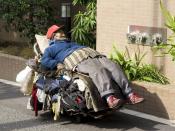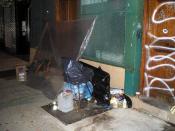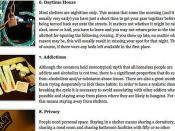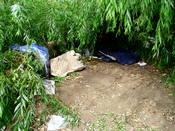Many of us associate the word "homeless" with drug addicts, alcoholics, and criminals while fully understanding that many of the homeless are men and women like the rest of us who lost their homes after being hit by hard times or tragedies. We brand the homeless as being a passive and lazy breed because doing so makes it easier to turn away from the foul stench when we pass by on the streets and say these people deserve their fate. As Martin declared in his essay, even though we recognize that sometimes the homeless are victims of circumstances, we still think of them as parasites of society (__).
It is unfortunately that we think of the homeless in that way, when they are a consequent of our actions, policies, intentions, errors, omissions, cruelties, and kindness(__). A large percentage of the homeless are people that have been failed by society, by the rest of us.
For example, we send teenagers into war, and when they come back battle-scarred, we fail to provide them with the psychological support they need to get past their traumatic experiences. According to Marin, veterans make up approximately 50 percent of the male homeless population (__). These are men who put their lives, their sanity, and their health at risk for their country. Upon their triumphant return from battle, these men after heralded in the press as "heroes", but years down the road, when they end up on the street pleading for spare change, we immediately jump to the conclusion that they are drug addicts or alcoholics looking to support their addictions.
How we stereotype the homeless, however, is not as detrimental as the how we've taken away their means of survival and impede their efforts to escape from life on the street. As Marin pointed out, a few decades ago, the homeless were able to survive on the streets. In the skid-row areas, they could manage to find shelter, food, clothing and jobs. But then as these areas were redeveloped, shelters were torn down and converted or redeveloped. As we started modernizing, the need for transient, homeless laborers was also eliminated. The homeless workers were replaced by machines and by foreign labor. Over the years, virtually all the tools the homeless had to survive had been gradually taken away, and today, they are left vulnerable and dependent on charity. So many critics look at the homeless and blame them for not "doing something" about their lives, but the truth is, we have made it impossible for them to survive, to find a way out. Jo Parker in her essay recounts a disturbing tale of how she was driven out of school because the "nice children" were too cruel to her clothes and her smell (__). Her poor family could not afford a change of clothing and the clothes she had could never be washed clean, as there was nothing in the budget for luxury hygiene products, like soap for example. When she was turned away from school, Parker was only in junior high. It is tragic to hear stories like Parkers' and think we took away a child's only chance at a better living, simply because she smelled. It seems that while most of us in theory support helping the homeless rebuild their lives, we are also too willing to sacrifice their interests.
Even in the rare instances when we try to do something for the homeless, it almost never fails that the project is geared toward the needs of those giving help as much as the needs of the homeless. For example, although City Year's volunteer team helped build a new shelter for the homeless, the project was primarily intended to be a team building exercise. Additionally, the members of City Year did not participate in the project because they wanted to help the homeless(__). They were looking to finish work for the week so they could receive their stipend. Regardless what the purpose of the project was, City Year's effort did ultimately benefit the homeless. Other efforts, however, were not as successful. Some charity programs are so degrading and oppressive that the homeless rather suffer on the streets than go through the process to receive help. As Marin points out in his essay, when the homeless go to charities for help, they are often confronted with bureaucracy, moral arrogance and contempt. To receive help, they are required to submit to elaborate, sometimes self-degrading requirements. For example, a homeless shelter in Santa Barbara required anyone who needed more than one night's stay to fill out a complex form on his or her personal failings, goals, and strategies. Jo Parker describes her experience of getting government help as "a chisel that chips on honor until honor is worn away." For seventy-eight dollars of assistance per month, Parker had to prove her destitution over and over again to government workers. She can only dream of a day when "asking for help does not eat away at the last bit of pride."





